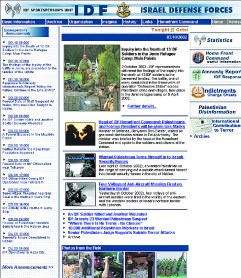Originally, the World Wide Web was envisioned as exactly that: a global vehicle for the unimpeded flow of information, without barriers, dams, blocks, filters, or censors. In techno-talk, the Internet was built on principles of "end-to-end neutrality," an engineering rule of thumb that recommends placing fancy features and "intelligence" at the edges of the network—typically, in the computers of end-users—rather than in the middle. The network itself had the simple job of enabling the open flow of data. But the Net has evolved, and what once appeared to be the first truly global information medium is now in danger of becoming balkanized into merely nationwide webs, according to recent research by assistant professor of law Jonathan Zittrain, J.D.-M.P.A. '95, and first-year law student Benjamin Edelman '02.
 |
| Saudi-blocked websites include pages for cannabis as well as for swimwear and the Israeli Defense Forces. |
 |
 |
Last spring, the Saudi Arabian government allowed the Law School's Berkman Center for Internet and Society, which Zittrain co-directs with professor of law Terry Fisher and Weld professor of law Charles Nesson, to access a Saudi proxy server that restricts the Internet's availablity to Saudi citizens. For two weeks, Berkman computers ran 24 hours a day, attempting to call up more than 60,000 Web pages. The center's report reveals that the Saudi government's Internet Services Unit blocked access to 2,038 of the websites tested. The researchers tried, for example, to fetch 795 pages containing pornography, but 695 were blocked. In the category of religion, including Islam and Judaism, they encountered 246 blocks. The Saudi gatekeepers also filtered out some music, humor, and movie sites, as well as 13 pages on homosexuality. Amnesty International's reports on human rights in Saudi Arabia were inaccessible, as were certain "translation" sites that could translate verboten material from other languages. "Anonymizer" sitestechnological proxies that request a page on behalf of the end userwere blacklisted as well.
To accomplish this Web filtration, the Saudis use a popular American product, SmartFilter software. They are doing on the national level what many Web users do privately. In fact, the ideal of an untrammeled Net never really existed in pure form. Early on, for example, parents insisted on mechanisms that would allow them to block their children from visiting web pages that offered explicit sexual material, drug-related information, and gambling. Blocking software allows companies to control employees' access to leisure sites. By paying an annual subscription fee, users can continually refresh their lists of off-limits URLs—just as anti-virus software packages update virus definitions as hackers launch new viral strains.
Zittrain and Edelman have also done a preliminary study in China, which blocks the BBC site as well as Playboy.com and has even unplugged the search engine Google on occasion. China "is interested in creating a China Wide Web, bordered by language and technology," Zittrain says. "The Chinese are trying to maintain a distinct culture, and feel hemmed in on all sides."
Other governments and government agencies have agendas as well. French courts, for example, have demanded that Yahoo! stop French users from visiting on-line auctions of Nazi memorabilia. In his course on Internet law, Zittrain teaches a case study on Quebec's language laws—which require any commercial speech in English to have a French version in larger type—and asks, "How might this apply to the Web?"
"We're trying to track the evolution of the Net," says Zittrain. "Is this a worldwide instrumentality that will be the same everywhere, or one that has local flavors and limitations?" Ultimately, Zittrain would like to monitor Web filters around the clock by using a "distributed application" similar to the special screensavers volunteers have installed on their computers to crunch SETI (Search for Extra-Terrestrial Intelligence) data when the machines are idle. That way, he says, "computers all around the world would give us an instant mosaic of where the blockages are."
~Craig Lambert
Jonathan Zittrain e-mail address:zittrain@law.harvard.edu
Berkman Center for Internet and Society website: https://cyber.law.harvard.edu








